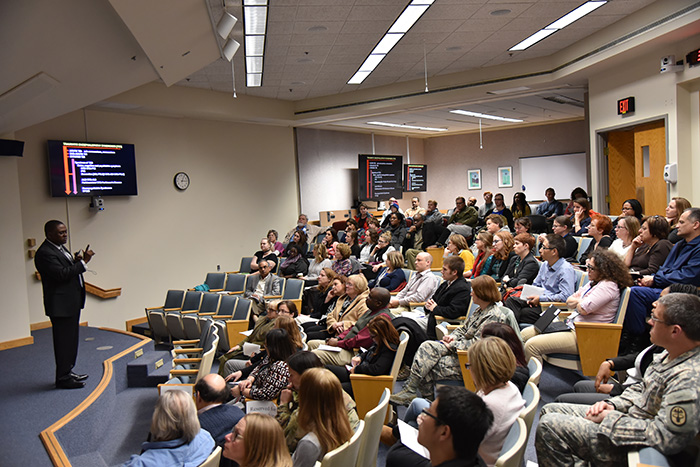Omalu Speaks at Fort Detrick on Chronic Traumatic Encephalopathy

Dr. Bennett Omalu spoke during a Professional Development Series lecture hosted by the U.S. Army Medical Research and Materiel Command Congressionally Directed Medical Research Programs at Fort Detrick on March 22.
Known as the concussion doctor, Omalu is a forensic pathologist at the University of California, Davis, and the first to discover and publish findings on neurodegenerative disease chronic traumatic encephalopathy, or CTE. Omalu's story was made into a movie Concussion starring Will Smith in 2016.
Omalu gave an impassioned talk on his Christian upbringing and having the courage and faith to work on his finding CTE despite the resistance from the National Football League and his colleagues in the medical community.
"Science is a human endeavor that seeks the truth. Faith is a human endeavor that seeks the truth. There is only one truth. Truth does not have a side. Truth does not have a perspective. There is no alternative truth," said Omalu. "Some would want you to think that science and faith do not go together, but I am here to tell you that that is not true. Science and faith have a common endpoint in truth. My science and my faith led me to the discovery of CTE."
Born in Nigeria, Omalu discovered a love of knowledge, and he pursued obtaining as much of it as possible.
During his autopsy of former Pittsburgh Steelers player Mike Webster, he wondered about what had happened to him.
"Could he have been suffering from the same thing that boxers suffer from?" said Omalu. "I promised Mike Webster that I would use my knowledge and education to find out what had happened to him."
Contact sports have long been suspected of causing neurologic injuries in some participants. After Omalu's autopsy of Mike Webster, he began his search to verify his findings in other athletes. His research confirmed that these athletes had an accumulation of the protein tau in masses called tangles or threads. Those afflicted prior to their deaths showed a spectrum of cognitive, emotional, behavioral and motor symptoms.
CTE is relatively new discovery and more research is needed to fully understand the disease. Omalu, along with his colleagues, are forging ahead with their research. Gary Small, Omalu's research partner director and professor of psychiatry at UCLA and one of the world's leading physician/scientists in the fields of memory and longevity, spoke more in-depth on their research after the conclusion of Omalu's talk.
"We are trying to take this research to the next step where we can determine a problem in the living instead of waiting until they are dead and having an autopsy. At that point, there is nothing we can do to help them," said Small. "We want to be able to help people from the spectrum of symptoms that we see in someone that has repeated brain injuries, including Soldiers."
 An official website of the United States government
An official website of the United States government
 ) or https:// means you've safely connected to the .mil website. Share sensitive information only on official, secure websites.
) or https:// means you've safely connected to the .mil website. Share sensitive information only on official, secure websites.


